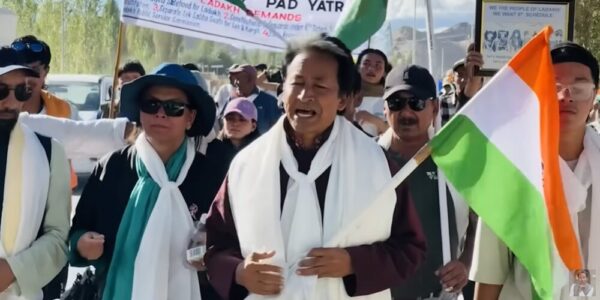Ladakh’s Movement for Statehood and Cultural Preservation Amid Environmental Concerns
Ladakh has struggled for administrative autonomy for many years. This struggle has transformed into a significant vehicle for ordinary people’s participation in public politics through the Ladakh Hill Development Council, established under the Ladakh Autonomous Hill Development Council Act of 1995. The first election for this council took place on August 28, 1995, marking a direct engagement of the people at the grassroots level.
Following the abrogation of Article 370, the state of Jammu and Kashmir was divided into two Union Territories: Jammu & Kashmir and Ladakh. This change led to a divide in ideology within Ladakh. The people of Leh welcomed the new Union Territory status, feeling it liberated them from relative deprivation under the Jammu and Kashmir state system.
Conversely, the people of Kargil expressed dissatisfaction, as the central government sought to centralize control over the autonomous hill councils. While the people of Leh achieved their long-standing demand for Ladakh to be recognized as a new Union Territory, there are growing concerns about how this status benefits the local population and secures their future under central governance. Many Ladakhis feel insecure regarding their culture, resources, and land, fearing the marginalization of their hill councils. This situation has given rise to an ideology closely related to power dynamics, used to justify the actions of certain social groups adhering to specific political beliefs.
* Click to Follow Voice of Ladakh on WhatsApp *
Following the establishment of the Union Territory, there has been a call for greater protection of local legacies, including cultural preservation, land rights, job security, and safeguarding the fragile environment, which is increasingly threatened by global warming. This perception has led to a new tribal movement spearheaded by two local political parties, APEX and KDA, which are demanding statehood and the implementation of the Sixth Schedule of the Indian Constitution to protect the tribal population and their interests through autonomous governance.
Among the critical issues raised, environmental concerns have emerged as a focal point. Environmentalist and social activist Sonam Wangchuk has initiated movements in Ladakh, organizing mass protests even in freezing temperatures. He has raised awareness about the disadvantages of Union Territory status and its impact on local people, cultural values, and the fragile environment. Under his leadership, he has become a guiding figure, directing collective action and inspiring individuals to raise their voices.
Wangchuk launched a “Climate Fast” for 21 days on March 6, marking a significant step in the movement to protect the culture, land, and environmental conditions of Ladakh. This initiative garnered support from various local and national figures, who expressed their solidarity and raised awareness among the Indian government regarding the plight of the Ladakhi people. The climate fast underscored the fragility of Ladakh’s environment and called for urgent action to address these challenges.
Religious institutions also showed their concern, with various religious groups participating in the movement. The religious influence is particularly significant in Ladakh, where the majority of the population in Kargil is Muslim and the majority in Leh is Buddhist. This dynamic is crucial for fostering a collective identity and resistance against detrimental changes, making it an essential factor in the future of Ladakh.
The Ministry of Home Affairs has engaged in discussions with local parties APEX and KDA but has yet to address their concerns comprehensively. Recently, the declaration of five new districts by the Honourable Home Minister, ShriAmit Shah, alleviated some of the grievances of the people of Zanskar and Drass, prompting APEX and KDA to refocus their efforts.
Sonam Wangchuk has embarked on a “Padayatra” (foot march) to New Delhi, appealing to the government for statehood and the Sixth Schedule, which would greatly aid in preserving cultural identity and protecting the environment.
This movement represents a new social initiative, emphasizing quality of life issues such as a clean environment. Notably, figures like Sonam Wangchuk are creating non-political formations to exert pressure on the state from outside. The movement also focuses on economic sustainability, ecological preservation, and political representation.
Disclaimer: The opinions expressed in this article are those of the author and do not necessarily reflect the views of Voice of Ladakh, its editorial team, or its affiliated organizations.



0 Comments